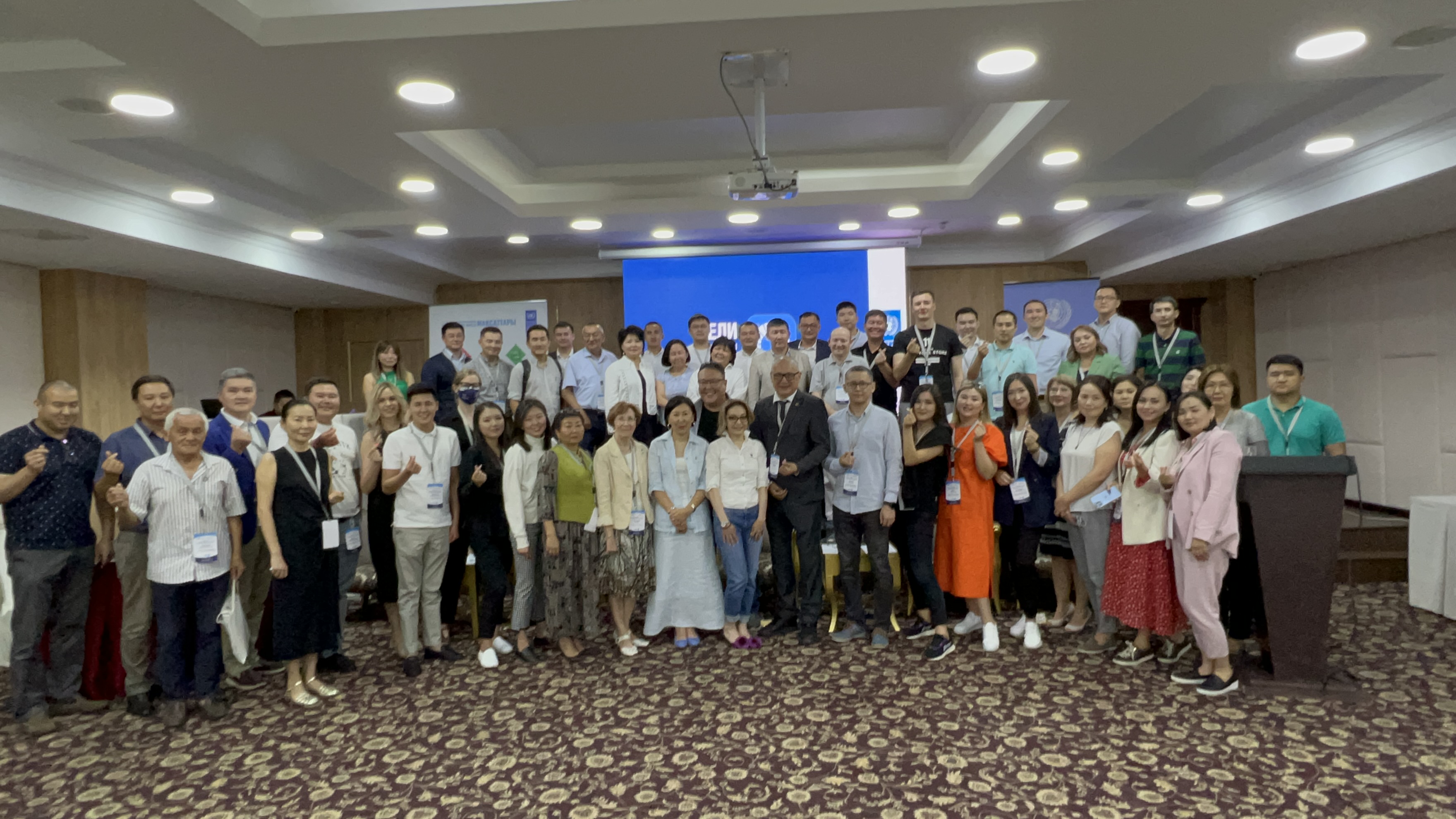UN in Kyrgyzstan held SDGs induction workshop for new staff of the president’s administration
August 1, 2022

BISHKEK, Kyrgyzstan, 30 July 2022 – More than 50 officials and experts of the Presidential Administration and the Cabinet of Ministers took part in the induction workshop to discuss the institutional landscape for the SDG coordination and oversight in light of the recent structural reforms. The participants, representing different departments and capacities, discussed the SDGs progress and challenges through intersectoral approaches covering legal, policy-making and practical implementation of the Agenda 2030 in the Kyrgyz Republic.
The workshop, organized by the UN with UNDP’s technical leadership and at the request of the Department of the Political and Economic Research of the President’s Administration, aims to enhance the Government capacity in different dimensions of SDGs to ensure consistency of the national policy among various Government entities and contribute to institutional effectiveness.
“I would call today's workshop an attempt to dive into the future. Today, as a team that prepares intellectual materials for decision-makers, we should work more efficiently and not omit invisible factors in our analysis so that the decisions reflected in our programs and strategies are more accurate in responding to future challenges, as it is increasingly critical to make quick and effective decisions. I am inspired by the matrix and philosophy behind the SDGs, which reflects the process of interrelationship of various spheres such as peace, partnership, economy, and prosperity”, stated in his opening remakrs Almaz Isanov, Head of Department of Political and Economic Research of the President’s Administration of the Kyrgyz Republic. He emphasized the importance of intersectoral development with particular attention paid to human rights, gender equality and environmental protection and noted the Government’s full understanding with the UN on the Sustainable Development Goals, especially against the impact of global processes on Kyrgyzstan, including COVID-19.
Christine Jaulmes, UNRC a.i., UNICEF Representative, said, “It is symbolic to hold this strategic workshop this year, when we celebrate the 30th Anniversary of Kyrgyzstan’s UN membership. The country needs not only knowledge and expertise; it is part of it, but it is not enough; adequate financing is critical too. It is time to stimulate private investment, both domestic and direct foreign investment, so that they can complement public funding and contribute to the development strategy. UNDP and UNICEF are currently working together with the Presidential Administration and the Government in designing the Integrated National Financial Framework (INFF).” UNRC a.i. expressed commitment to provide continued assistance in attaining the SDG targets in line with the ‘leave no one behind’ principle and thanked the Presidential Administration and the Cabinet of Ministers for strong commitment to the SDGs, integrating the SDGs in the national development agenda, and their aspirations to become a regional leader in the Agenda 2030.
Vesna Dzuteska-Bisheva, Head of Sustainable Development Programme of the UNDP Istanbul Regional Hub, emphasized that this training was taking place at a crucial moment. “Globally, the development trajectory is at the crossroad, with multiple risks for people, societies, and economies. The COVID-19 pandemic stalled the progress towards the SDGs, threatening to wipe out the development gains attained in the previous two decades in poverty eradication, prosperity and progress. Basically, the confluence of health, economic, environmental and political emergencies, the record high food, energy and commodity prices, rising interest rates burden and put pressure on the recovery, putting at risk the economy to plunge into a new recession.” She stated that with only eight years left until 2030, the success of achieving the SDGs would require a fundamental shift in the development model and policy priorities including an increasing investment in people, expansion of social protection coverage, provision of quality education, creation of decent jobs, transition to renewable energy and ensuring digitalization for all. Ms. Dzuteska-Bisheva stressed the importance of integrating the SDGs into the national financing framework and praised continued commitment of the Presidental Administration to support the ongoing development finance assessment and the preparation of the INFF. She expressed hope to heare about the outcome of the workshop discussion as part of one of the regional events to be organized under UNDP and EU support on SDGs platform for Central Asia.
The induction workshop was delivered during the weekend to ensure uninterrupted and deep dive into SDG discussion. The sessions, covering SDGs complex interlinkages, broad-based coordination with stakeholders, integration with national programmes, means of SDGs implementation, INFF, was delivered by international or local trainers, including current and former SDG champions of the President Administration and the Government, UN agencies' staff members, policy, economic, environmental, social and gender experts.
The expected results of the induction workshop is, with more knowledge about all dimensions of SDGs and their adaptation and implementation in the Kyrgyz Republic gained, an agreed action plan to continue capacity strengthening events on SDGs to ensure whole-of-government and whole-of-society approach in SDG implementation in the Kyrgyz Republic.
*Background:UNDP’s Rapid Integrated Assessment (RIA) conducted in early 2020 highlighted that the alignment of the SDGs with national strategic development planning is at 82%. Although the alignment is high, the implementation challenges remain in all areas of SDGs adaptation and implementation, including proper integration (not declarative), of SDGs into development programs at all levels- national, sectoral and regional, making budgeting and monitoring aligned with SDGs, data issues and limited financial resources and weak capacity to work on SDG integration at full scale. The Covid-19 impacted negatively the SDGs gains of the KR, no doubt.

 Locations
Locations